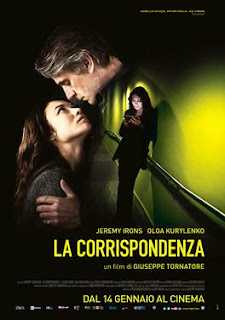The Correspondence
There's a dilemma faced by any writer crafting a script about contemporary life: is it before cell phones, or after? This can be a big issue, because many plot points in pre-cell phone days could be solved by having one. I think the greatest example is "The Chinese Restaurant" episode of Seinfeld, where George is waiting for a pay phone. La La Land, which presumably was contemporary, has a scene that could have avoided with a cell phone, which makes one take notice.
The Correspondence, an English-language Italian production written and directed by Giuseppe Tornatore, goes full bore on the post-cell phone era. It even refers to specific dates, and we know that it is 2015. An astronomy professor, Jeremy Irons, and his former student, Olga Kurylenko, are goofy in love, so much so that it starts to get annoying. Then the other shoe drops: Irons dies, but she still gets texts and emails from him.
Turns out that he knew he was going to die, and set up automatic texts and emails, and periodically discs that contain taped messages from him are delivered to her. So basically we are watching people watching video or reading their phones, and at just over two hours, The Correspondence seems twice as long. Perhaps if Tornatore had set in an earlier time period, he could have made it more interesting.
Sometimes texting can be exciting in a movie. Olivier Assayas did it in Personal Shopper, but Tornatore has too much to fill to make it interesting. He does try to jazz things up by making Kurylenko a stunt woman (and a doctorate student in astrophysics, surely the only person who has that distinction). There are also some trips to a beautiful Italian island, where Irons owns a home (academics are much richer in movies than they are in real life). Kurylenko does a fine job with a demanding role, and she's called upon to cover a range of emotions.
So The Correspondence was really a wrong-headed idea to begin with, and should have never been made as it is. That's a shame, because I love Irons, but mostly we see talking into a web-cam.
The Correspondence, an English-language Italian production written and directed by Giuseppe Tornatore, goes full bore on the post-cell phone era. It even refers to specific dates, and we know that it is 2015. An astronomy professor, Jeremy Irons, and his former student, Olga Kurylenko, are goofy in love, so much so that it starts to get annoying. Then the other shoe drops: Irons dies, but she still gets texts and emails from him.
Turns out that he knew he was going to die, and set up automatic texts and emails, and periodically discs that contain taped messages from him are delivered to her. So basically we are watching people watching video or reading their phones, and at just over two hours, The Correspondence seems twice as long. Perhaps if Tornatore had set in an earlier time period, he could have made it more interesting.
Sometimes texting can be exciting in a movie. Olivier Assayas did it in Personal Shopper, but Tornatore has too much to fill to make it interesting. He does try to jazz things up by making Kurylenko a stunt woman (and a doctorate student in astrophysics, surely the only person who has that distinction). There are also some trips to a beautiful Italian island, where Irons owns a home (academics are much richer in movies than they are in real life). Kurylenko does a fine job with a demanding role, and she's called upon to cover a range of emotions.
So The Correspondence was really a wrong-headed idea to begin with, and should have never been made as it is. That's a shame, because I love Irons, but mostly we see talking into a web-cam.



Comments
Post a Comment